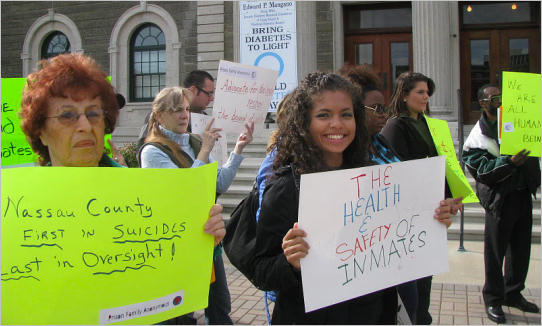NYCLU on Arrest of Columbia University Demonstrators
Civil Liberties Union
Following the recent suicide of an Iraq war veteran housed at the Nassau County Correctional Center – the fifth inmate suicide in less than two years – the New York Civil Liberties Union today filed a lawsuit to compel county officials to comply with a 22-year-old unfulfilled charter mandate to establish an independent board charged with overseeing and reforming conditions at the jail.

“Tragically, a stay at the Nassau County Jail can become a death sentence for the 11,000 people a year who are housed there awaiting trial or serving time for minor offenses,” said Samantha Fredrickson, director of the NYCLU’s Nassau County Chapter. “Since Nassau County Executive Edward Mangano has turned a blind eye to this disturbing reality, we have no choice but to ask the court to compel the county to take this initial step toward finally treating people housed at the jail with basic human dignity.”
The lawsuit was filed in State Supreme Court for Nassau County on behalf of two individuals currently housed at the county jail. It seeks to force the county to fulfill its duty to establish the Board of Visitors, an independent oversight committee that has never fully operated since being established in 1990. The county charter authorizes the seven-member committee to respond to inmate grievances and advise the sheriff on programs that would improve the care and treatment of people housed at the jail.
The lawsuit follows the suicide of a 33-year-old Iraq War veteran who was found on Feb. 24 hanging in his cell. He is one of seven people who have died while in custody at the jail since January 2010, including five suicides. State authorities have indicated that several of those deaths were clearly preventable.
Plaintiff Joseph Marone was forced to wait weeks to see a nurse after noticing blood discharging from his left ear. By the time a nurse examined him, the bleeding had stopped, though he believes he suffered hearing loss. After injuring his hand and ribs in an accident involving his cell door, Marone was given over-the-counter medication that did not alleviate his pain. Doctors x-rayed his hand, but not his ribs, which continue to hurt him when he breathes. Marone filed numerous grievances complaining of this inadequate care, but the county and jail officials failed to address his concerns.
“People shouldn’t be forced to live in constant pain because the county won’t provide them basic medical care,” said Marone. “I hope this lawsuit marks the beginning of the end of the county’s cruel indifference toward people housed at the jail.”
Over the same period, the NYCLU has received more than 200 complaints from people incarcerated at the jail about the failure to provide necessary medication, the mistreatment of persons with disabilities and the utter lack of mental health services at the jail. The number of complaints has escalated dramatically since the county hired a private contractor to provide medical and mental health care at the jail. Many of these complaints point to the facility’s inadequate grievance system.
Plaintiff Paul Nantista has had difficulty receiving medical treatment at the jail on numerous occasions. Most recently, he was unable to have a doctor examine a broken toe on his right foot. Though the toe was severely swollen, he received no pain medication for it.
“My toe was clearly broken, and yet I couldn’t see a doctor,” Nantista said. “Living behind bars is hard enough without having your basic medical needs ignored.”
According to the county charter, the Board of Visitors is to be composed of seven county residents who will serve three-year terms and have some “working knowledge of the correctional system.” The committee is required to have an office at the jail and access to jail records, books and data. Committee members would be appointed by Mangano and serve without compensation.
“The recent deaths represent the latest chapter in a long saga of mistreatment and neglect at the jail,” said NYCLU Senior Staff Attorney Corey Stoughton, lead counsel in the case. “For more than 30 years, the county has failed to meet its legal and moral obligations to treat inmates humanely. Strong, independent oversight can help end this troubling history and finally ensure that inmates receive the basic medical care they need.”
In 1981, the Nassau County sheriff entered into a consent judgment with inmate plaintiffs who had complained of unconstitutional conditions of confinement in the jail. Throughout the 1980s, people housed at the jail won a series of lawsuits arising from the county’s failure to comply with the consent judgment.
In 1999, inmate Thomas Pizzuto died while in custody at the jail, allegedly the result of a beating by corrections officers. Four corrections officers received prison sentences in the case. That same year the U.S. Department of Justice launched an investigation that found unconstitutional violations at the jail due to deliberate indifference towards inmates’ serious medical needs and incidents of excessive use of force against inmates.
In 2002, the county entered a consent decree with the DOJ that mandated significant changes to the jail’s policies and procedures governing medical and mental health care and use of force. Less than a year after the DOJ ended its oversight of the jail, the state Commission on Correction in 2009 issued a report indicating that the jail was not meeting minimum statewide standards for correctional facilities.
In addition to Stoughton, New York University Civil Rights Clinic students Jessica Scholes and Richard Sawyer are working on the case.